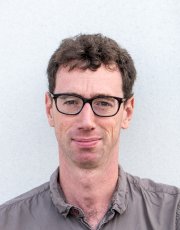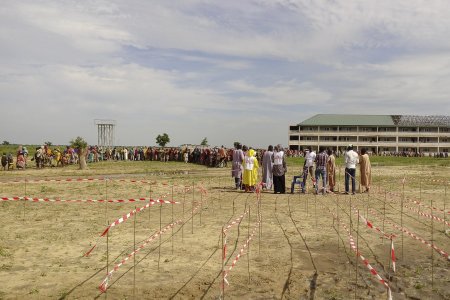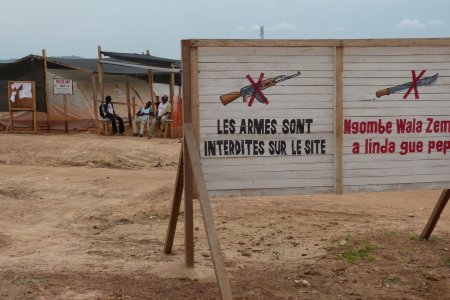
Should we discriminate in order to act? Profiling: a necessary but debated practice
Françoise Duroch & Michaël Neuman
In this article for the Humanitarian Practice Network, head of the Research Unit on Humanitarian Stakes and Practices (UREPH) for MSF Geneva Françoise Duroch and Crash director of studies Michaël Neuman discuss the implications and reasons behind the growing practice of staff profiling for MSF.
In October 2020, MSF organised a workshop in Dakar on staff profiling in operations in the Sahel. Profiling involves the selection of staff based on non-professional criteria, including nationality, skin colour, gender and religion. As such, it raises a number of ethical and practical concerns. As a result of profiling, US nationals have not been deployed in MSF operations in Colombia because of the risk of kidnapping, and Chadians and Rwandans have been excluded in the Central African Republic and eastern Democratic Republic of Congo respectively, because of regional conflicts. The use of profiling has increased in recent years in West Africa, as the threat of kidnapping of Westerners by radical jihadist groups has intensified.
The rationale for profiling
The reduction in the number of Western staff of humanitarian agencies in certain parts of the world is in response to a genuine risk of kidnapping, as one workshop participant put it: ‘Everyone agrees that there are some nationalities that can’t go to these areas, so how can we adapt and continue to do operations for these populations in need?’. Over the last few years, measures aimed at promoting staff from Africa do seem to have enabled operations to go ahead that would otherwise have been difficult or impossible to develop, particularly in Mali, Niger, Burkina Faso and northern Nigeria.
The selection of employees based on non-professional criteria is not always explicitly defined and practices vary from one project to another: nationality, skin colour and religion are sometimes simultaneously or successively used. The measure is often implemented after a risk analysis carried out by field and HQ teams, but it can sometimes be imposed by military-political interlocutors: ‘Do not send white people into our territories, they will be kidnapped’.
For years a marginal practice within MSF, profiling is now much more common, to the point where one of the organisation’s managers feels that ‘We have made the exception normal’. In the Sahel countries MSF works in, profiling has been used in the majority of recent projects, and international staff deployed are mainly black Africans. MSF considers that the risk of Westerners being kidnapped is particularly high in these regions, and therefore applies profiling to reduce this specific risk.
The normalisation of this personnel policy has raised a series of questions among staff affected by profiling: ‘You have profiled [the project], you have removed white people, what will happen next, won’t we be the next targets?’.
Efficiency: what works
Does profiling effectively reduce risks? Or is it simply transferring risks from Westerners to Africans?
In reality, while ‘profiling’ reduces the risk of kidnapping of Westerners, it does not diminish other dangers, such as arrest, attacks on convoys, bombings or suicide attacks. The kidnapping of non-Westerners is also on the rise. Projects are, in other words, still highly dangerous. The range of risks presents a dilemma: is it better to face a kidnapping of a Westerner, or to deploy someone whose ransom price might be lower, but who might be at greater risk of trauma or torture?
These questions become all the more critical when the risk of kidnapping of expatriate African or national staff rises: colleagues point out that, in the event of a kidnapping, their government will find it much more difficult to negotiate effectively, particularly for staff from poorer countries, or countries where the government is simply less willing to pay a ransom.
It has also emerged in discussion – and this has been corroborated by data collected by MSF – that locally recruited staff are most exposed to risk as they are more mobile, involved in negotiations with a wide range of military-political actors, such as soldiers or militia stationed at checkpoints, and are often on the front line.
Profiling as seen by profiled staff: sharing experiences
Many MSF staff challenge the very notion of profiling. They believe that staff should be selected primarily on their skills and knowledge of the cultural and social codes of the countries they work in. Participants at the Dakar workshop rejected the paternalistic assumption that the precariousness of their situation forces them to accept any kind of work, including high-risk positions. They also highlighted that the implementation of profiling practices has opened up professional opportunities for them.
However, several participants mentioned the frustration of being seen as somehow less professional or qualified: ‘There is also a feeling of being “second-class” staff, sent to the front while their Western colleagues stay in HQ or at coordination level, and a feeling of injustice at always being sent to high-risk contexts’.
Human resources managers at the Dakar workshop agreed: ‘Profiled staff aren’t offered the same job opportunities. Not because their credentials or skills are not as good, but because we know that the person will probably best fit our needs’. Because experienced ‘profiled’ staff willing to work in high-risk contexts like northern Mali are difficult to find and retain, HR managers do not want to ‘lose’ them to programmes in countries like Malawi, where risk and stress levels are much lower. However, an African colleague deployed to several dangerous missions emphasised the need for people who work in such contexts to alternate high-risk postings with less risky positions to enable them to have more time with families and a better work-life balance in general. Whether they are given the opportunity to do so is another matter if they are not offered less dangerous postings in the first place.
Consent and information
Contrary to MSF’s risk policy, which places responsibility for risk-taking at the field level, the perception is that too often the decision to profile a project is taken at headquarters, without adequate consultation with field teams: ‘What is the place of the national staff’s contribution to these analyses and decision-making?’. Some project teams have challenged whether profiling is necessary, especially when no formal threat supports the decision: ‘We didn’t receive any threats. Under these conditions, it is difficult for the field to accept profiling measures’.
Discussions also revealed the limits of the conditions under which people agree to join profiled projects, something which we will refer to as a lack of ‘informed consent’. Some colleagues explained that they found out only later that these policies were being implemented, and that they were the focus of these policies: ‘Working for MSF, I didn’t expect to encounter a team that was so culturally homogeneous’. Another participant mentioned that he probably wouldn’t have accepted a position as project coordinator had he known that the team was profiled.
Beyond the issue of information on the dangers involved, one participant highlighted the need for MSF to clarify what it would and wouldn’t be able to provide in the event of an incident: ‘I can say yes to a risky mission, but I want to know what compensation my family will receive if something happens to me and if my organisation will support me to negotiate my release in the event of a kidnapping’.
Human resources and project management
These issues of responsibility are intertwined with others related to the recruitment and management of staff. Human resources colleagues stress their discomfort when having to evaluate certain criteria, particularly concerning a person’s religion or other private matters for which they consider themselves not only not competent, but also in conflict with professional ethics.
The proliferation of non-professional criteria also leads to a reduction in the number of possible deployment contexts for particular groups of people, and therefore their chances of development and advancement: ‘This can create a sense of unease for the teams in charge. The more criteria there are, the smaller the field of candidates’. One participant shared their feelings about being sent only to high- risk contexts: ‘The problem for profiled teams is to hear that they are needed today because of the security situation, but that they will be easily dismissed later because, in the end, they are only good for working in the Sahel countries’.
A way forward
While the practice of profiling as a necessary compromise for conducting operations in some contexts has been largely accepted within MSF and has even been praised for creating individual and collective opportunities, concerns remain as to how it should be implemented. Many profiled employees feel like they belong to a poorly considered category of staff, have limited professional opportunities and are kept away from the collective production of risk analyses. The discussion in Dakar outlined a way forward, through proper operational support for teams that otherwise feel isolated, the roll-out of HR policies focusing on placement and career development, the development of collaborative and inclusive practices in terms of security management and the responsibilities of MSF as an employer towards staff required to work in particularly risky contexts. Taking these priorities on is a necessity, as much to maintain activities in these regions as to address inequalities in status among the organisation’s staff.
To cite this content :
Françoise Duroch , Michaël Neuman, “Should we discriminate in order to act? Profiling: a necessary but debated practice”, 28 janvier 2021, URL : https://msf-crash.org/en/blog/humanitarian-actors-and-practices/should-we-discriminate-order-act-profiling-necessary-debated
If you want to criticize or develop this content, you can find us on twitter or directly on our site.
Contribute



Add new comment